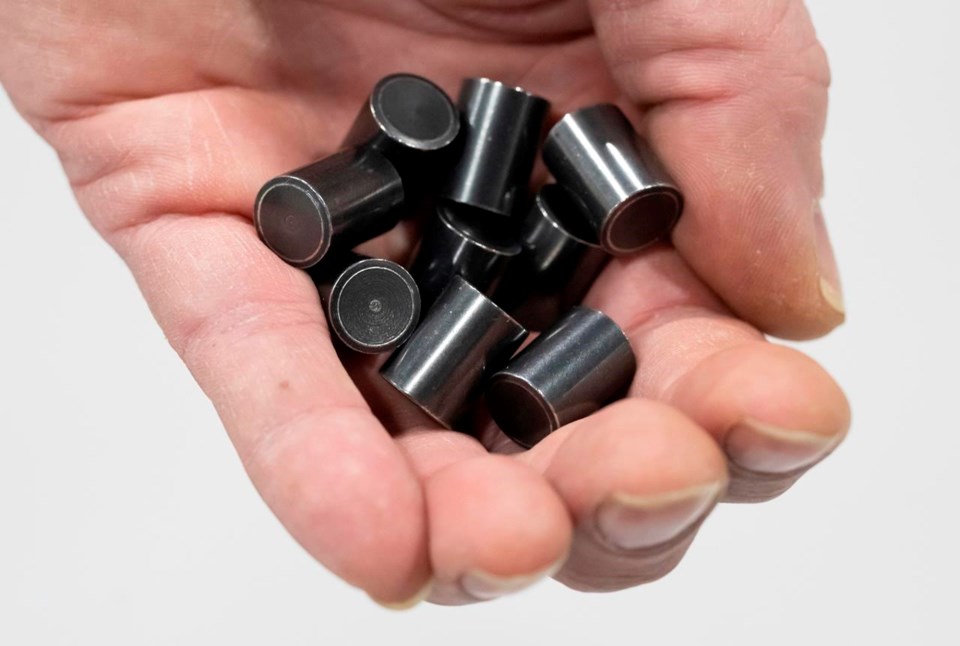Here is a roundup of stories from The Canadian Press designed to bring you up to speed on what you need to know today...
Key milestone upcoming for Canada's nuclear waste
A critical milestone is on the horizon for Canada's 175-year-long plan to bury its nuclear waste underground, with two pairs of Ontario communities set to decide if they would be willing hosts.
Late next year, the Nuclear Waste Management Organization plans to select the site for Canada's deep geological repository, where millions of bundles of used nuclear fuel will be placed in a network of rooms connected by cavernous tunnels, as deep below the Earth's surface as the CN Tower is tall — if the process goes according to plan.
The sites are down to the Wabigoon Lake Ojibway Nation-Ignace area in northwestern Ontario and the Saugeen Ojibway Nation-South Bruce area in southern Ontario. The municipalities and First Nations are planning votes for next year, the culmination of a years-long information gathering process that some say has left deep divisions within their communities.
While officials say they are confident at least one area will say yes, two rejections would be a major setback for the $26-billion project, which has been in the works for some 20 years.
Saskatchewan to break law, premier says it's 'unfortunate'
Saskatchewan Premier Scott Moe says it's unfortunate his province is prepared to break federal law by not remitting the carbon levy to Ottawa.
In a year-end interview with The Canadian Press, Moe says the violation is a result of the province wanting to provide fairness to Saskatchewan residents.
In October, Prime Minister Justin Trudeau announced people who use heating oil are exempt from having to pay the carbon levy over the next three years.
Moe then asked for that exemption to cover all other forms of heating, but was denied.
That prompted him to direct Saskatchewan's natural gas utility, SaskEnergy, to not remit carbon charges starting January 1st.
The province passed legislation this fall that aims to shield the company from legal ramifications. Instead, the province plans to bear that burden.
Manitoba to boost school meal program
The Manitoba government is planning to take a step in the coming weeks toward its plan for a universal school meal program.
Premier Wab Kinew says the government is putting up $1.5 million to eliminate a waitlist at the Child Nutrition Council of Manitoba for the remainder of the current school year.
The non-profit council grants money for meal and snack programs in schools that apply for help, and there were 51 programs on a wait list as of earlier this year.
One of Kinew's promises before being elected in October was a universal school nutrition program that would cost the province an estimated $30 million a year.
The education and early childhood learning department says the universal program is still in the early stages of development and there is no proposed cost right now.
Experts say geothermal could be next big thing
Geothermal energy hasn't yet taken off in Canada, but a number of new projects underway appear to indicate the industry could be in for a hot decade.
Geothermal energy refers to harnessing the heat that occurs naturally deep within the earth to produce clean, renewable power.
Many parts of Canada sit on top of significant geothermal resources, but there's never been a commercial geothermal power plant in this country because of high exploration and extraction costs.
However, the climate crisis is making the need to develop clean power more urgent than ever.
That fact has Canadian companies developing technological breakthroughs they say will make it easier and more cost-effective to tap the heat within the earth.
The ‘stewardesses’ who fought sexism in the skies
Senka Dukovich (DU'kah-vitch) signed on with Air Canada in 1973, agreeing to a collective contract that required her to quit by age 32.
Before the 1970s, female cabin crew, then known as stewardesses, faced discriminatory hiring and work policies marked by strict weight limits, age ceilings, appearance guidelines and marriage bans. But, amid a swelling tide of second-wave feminism — from Chatelaine to the Royal Commission on the Status of Women — a new generation of flight attendants fought to overturn sexist expectations and bring fair labour standards to the skies.
Dukovich, a union activist, who earned her law degree while working as a "stewardess," was fighting as late as 1987 to reform what she alleged in a human rights complaint was widespread sex discrimination in the industry.
Ironically, the changes spearheaded by Dukovich and other flight attendants arrived just as the image associated with the job became more sexualized.
Ad campaigns featured young women who mouthed taglines such as “Fly me” — National Airlines — “We move our tails for you” — Continental — and, in print, “Have you ever done it the French way” — Air France.
The Israel-Hamas conflict continues its bloody grind
The Israeli military says it has expanded its ground offensive in the Gaza Strip to the densely populated urban refugee camps in the central part of the territory.
Residents reported shelling and airstrikes shaking the Nuseirat, Maghazi and Bureij camps. The built-up towns hold Palestinians whose families fled or were driven from their homes in what is now Israel during the 1948 war surrounding Israel’s independence.
The camps are now crowded with Palestinians who fled northern Gaza in the early stages of Israel’s ground offensive.
Meanwhile, Gaza’s main telecom provider announced another “complete interruption” of services.
---
This report by The Canadian Press was first published Dec. 27, 2023
The Canadian Press



